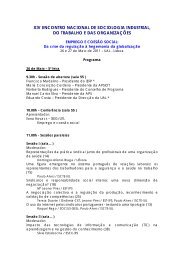Web-based Learning Solutions for Communities of Practice
Web-based Learning Solutions for Communities of Practice
Web-based Learning Solutions for Communities of Practice
You also want an ePaper? Increase the reach of your titles
YUMPU automatically turns print PDFs into web optimized ePapers that Google loves.
xx<br />
(Greece) - by focusing on the particularities <strong>of</strong> online communities <strong>of</strong> practice (CoPs) and the tools<br />
they use <strong>for</strong> facilitating or enhancing collaboration among their members - introduces a framework <strong>for</strong><br />
mining knowledge that is hidden in such settings. The authors’ motivation stems from the criticism that<br />
contemporary tools receive regarding lack <strong>of</strong> active participation and limited engagement in their use,<br />
which is partially due to the inability <strong>of</strong> identifying and exploiting a set <strong>of</strong> important relationships among<br />
community members and the associated collaboration-related assets. The overall approach described<br />
in this chapter elaborates and integrates issues from data mining and social networking. The proposed<br />
framework enables CoPs members to rank the contributions <strong>of</strong> their peers towards identifying meaningful<br />
relationships, as well as valuable in<strong>for</strong>mation about roles and competences. First, the characteristics <strong>of</strong><br />
the overall collaboration setting are modeled and a set <strong>of</strong> associated metrics is proposed. Next, to reveal<br />
unnoticed knowledge residing within CoPs, a data mining technique that groups users into clusters and<br />
applies advanced social networking analysis on them is proposed.<br />
Chapter 8, “Live Virtual Technologies to Support Extended Events in Online <strong>Communities</strong> <strong>of</strong> <strong>Practice</strong>”<br />
by Eleftheria Tomadaki, Peter Scott and Kevin Quick, Open University (UK), presents qualitative<br />
and quantitative data from a naturalistic insight into the use <strong>of</strong> two online synchronous communication<br />
tools, FM <strong>for</strong> videoconference and Hexagon <strong>for</strong> ambient awareness, to support an extended event in<br />
a working online community. As claimed by the authors, a complex mix <strong>of</strong> planned and opportunistic<br />
interactions requires a new set <strong>of</strong> working synchronous tools, managing the trade-<strong>of</strong>f between awareness<br />
and disruption. Switching between <strong>for</strong>eground and background ‘meeting activity’ remains a very<br />
big challenge.<br />
Chapter 9, “Individual <strong>Learning</strong> and Emotional Characteristics in <strong>Web</strong>-<strong>based</strong> <strong>Communities</strong> <strong>of</strong> <strong>Practice</strong>”<br />
by Nikos Tsianos, National & Kapodistrian University <strong>of</strong> Athens (Greece), Zacharias Lekkas, National<br />
& Kapodistrian University <strong>of</strong> Athens (Greece), Panagiotis Germanakos, University <strong>of</strong> Cyprus (Cyprus),<br />
and Constantinos Mourlas, National & Kapodistrian University <strong>of</strong> Athens (Greece), argues that the<br />
knowledge management paradigm <strong>of</strong> communities <strong>of</strong> practice can be efficiently realized in <strong>Web</strong>-<strong>based</strong><br />
environments, especially if one considers the extended social networks that have proliferated within the<br />
Internet. In terms <strong>of</strong> increasing per<strong>for</strong>mance through the exchange <strong>of</strong> knowledge and shared learning,<br />
individual characteristics, such as learners’ preferences that relate to group working, may be <strong>of</strong> high<br />
importance. These preferences have been summarized in cognitive and learning styles typologies, as<br />
well as emotional characteristics which define implications that could serve as personalization guidelines<br />
<strong>for</strong> designing collaborative learning environments. The chapter discusses the theoretical assumptions <strong>of</strong><br />
two distinct families <strong>of</strong> learning style models, cognitive personality and in<strong>for</strong>mation processing styles,<br />
and the role <strong>of</strong> affection and emotion, in order to explore the possibilities <strong>of</strong> personalization at the group<br />
level <strong>of</strong> communities <strong>of</strong> practice.<br />
Chapter 10, “From ‘Collecting’ to ‘Deciding’: Facilitating the Emergence <strong>of</strong> Decisions in Argumentative<br />
Collaboration” by Manolis Tzagarakis, Nikos Karousos, George Gkotsis, Vasilis Kallistros,<br />
Spyros Christodoulou, Christos Mettouris, Panagiotis Kyriakou, and Dora Nousia, Research Academic<br />
Computer Technology Institute (Greece), elaborate argumentative collaboration issues in the context <strong>of</strong><br />
communities <strong>of</strong> practice. As argued by the authors, current tools aiming at supporting argumentative collaboration<br />
provide either means to successfully tame wicked problems or advanced reasoning mechanisms<br />
to facilitate decision making creating a gap in today’s landscape <strong>of</strong> systems supporting argumentative<br />
collaboration. The consequences <strong>of</strong> this gap are in particular severe <strong>for</strong> communities <strong>of</strong> practice when<br />
they have to employ tools from both sides to support their collaboration needs. The authors claim that<br />
a key factor in bridging this gap is viewing argumentative collaboration as an emergent phenomenon.<br />
Proper support <strong>of</strong> the emergent aspects <strong>of</strong> argumentative collaboration would benefit systems supporting<br />
argumentative collaboration as this would enable those systems to support the evolution <strong>of</strong> the entire



